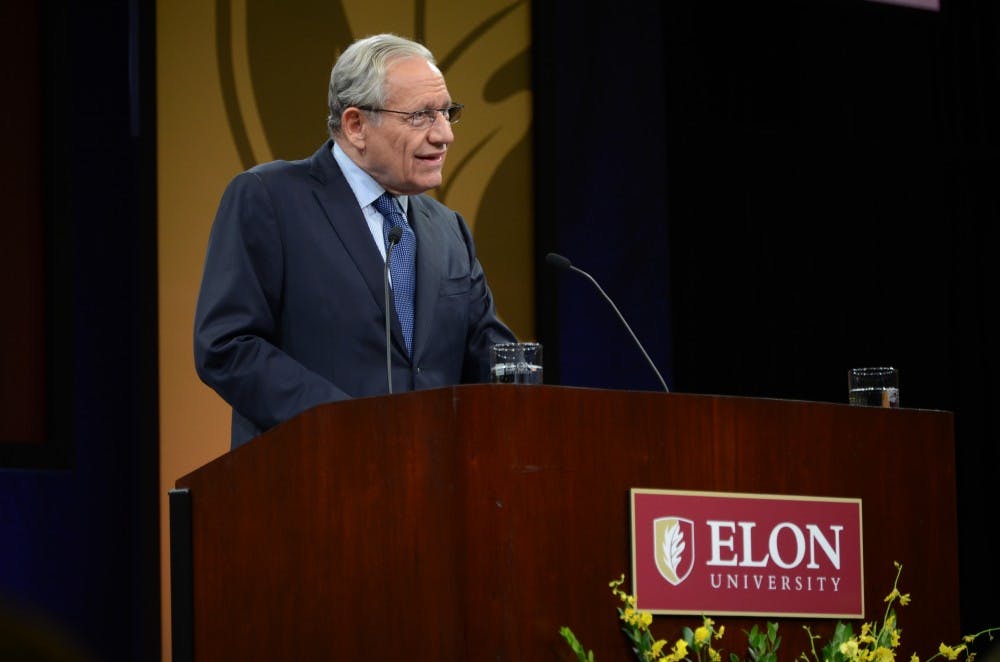“All the President’s Men,” a book and movie documenting Pulitzer Prize-winning journalists Bob Woodward’s and Carl Bernstein's investigation of the Watergate scandal, has been nominated for Academy Awards and hailed internationally by critics.
But for Woodward, the movie helped him win something else in the 1970s, too.
“During that era, I could get a date on the telephone with almost anyone,” Woodward said, chuckling. “And then I would show up at the door, and the date would look, and then I would see disappointment.”
Speaking in front of a packed audience at Elon University’s Fall Convocation, Woodward elaborated on the same sentiment of not knowing the facts. Woodward said many of his dates were expecting Rob Redford, the actor who played him in the film. And just as the women assumed something different, Woodward used the 2016 presidential election and other historical and current issues in the United States to stress the importance of understanding the bigger picture.
“What we know from our history is that the inexplicable can happen,” Woodward said. “As we sit here in 2016, what’s going to happen that’s inexplicable? Who knows?”
Woodward, 73, said many of the problems after 1960s were unscripted, such as the assassinations of President John F. Kennedy and Martin Luther King Jr., the Vietnam War and the 9/11 terrorist attacks, and more calamities and adversity will inevitably arise. In light of this, Woodward said the greatest fear for the United States today is the lack of solid leadership to lead the country though those such times.
Carl Bernstein and Woodward methodically reported the crimes of President Richard Nixon for the Washington Post, leading to a multi-year investigation that influenced Nixon's resignation in 1974. Since then, Woodward has interviewed and written books on presidents and other important figures since then, including President Bill Clinton and former Deputy FBI Director W. Mark Felt — also known as Deep Throat during the Watergate investigations — and still reports on politics for The Washington Post.
Associate Professor of Communications Anthony Hatcher discusses Bob Woodward with ELN Morning.
Just as Nixon kept secrets during his tenure in the Oval Office, Woodward said the controversies surrounding current presidential candidates concern him. By Republican candidate Donald Trump refusing to release his taxes and Democrat candidate Hillary Clinton not correctly addressing her classified email scandal, Woodward said they are isolating themselves instead of being transparent — traits eerily similar to Nixon.
“Democracies die in darkness,” Woodward said. "We have a history of democracies shredding themselves when they live in darkness. That could happen — I’m not going to say it will happen — but it could happen if we are not vigilant.
“When you look back 10 to 20 years and ask, ‘What was happening in America back then?’ You say we had a presidential campaign that is written and spoken in acid.”
Towards the middle of his speech, Woodward asked the crowd 10 yes-or-no questions about national issues, ranging from if they are confident United States is safe from terrorism to whether trust the national media. The response from the mixed-age audience was overwhelmingly negative to both of these questions.

Woodward believed this was largely because of the candidates shielding themselves. He recently interviewed Trump and has known Clinton since she was the First Lady. As election season has progressed, Woodward said both candidates have become more reclusive. He implied that most of the presidents after Nixon — specifically President Jimmy Carter for his leadership during the 1978 Camp David accords — can act as role models to the next Commander in Chief because of their doggedness.
When Woodward had lunch with former Washington Post publisher Katherine Graham in the midst of his Watergate reporting, he said Graham instilled this mindset in him and it is imperative to hold people in power accountable. At the time of that meeting, The Washington Post’s stocks plummeted because of Watergate, and many thought presidential corruption was, “absurd.”
Graham motivated Woodward to continue reporting and said the public should do the same with regard to holding the current candidates accountable.
“Our job was to get to the bottom of this,” Woodward said, recalling his conversation with Graham. “This story involves the president of the United States, so we have a triple quadruple to answer the big question about this.”
Reactions from the crowd after Woodward’s speech were positive, and many applauded him for tackling controversial topics. Junior Hannah Podhorzer became a fan of Woodward in high school when her history class learned about Nixon’s presidency. She said his speech was enlightening to her because of his historical perspective on current issues, and she hopes her peers can learn from his expansive background.
“I was not expecting him to talk about the current election, so that was really surprising,” Podhorzer said. "I really enjoyed his commentary, and I hope people can take something away from his many years of experience."
Paul Parsons, dean of the School of Communications, echoed Podhorzer’s feelings, saying the timing of Woodward’s speech could not have been any better.
“He did talk about 30 years ago and Watergate, but he also talked about current events and the election," Parsons said. "I guess my hope is by doing that — and it’s sort of dangerous for him to do that in such polarized society — that more students will find themselves paying attention to what’s going on around them.”


